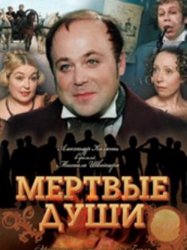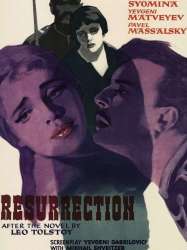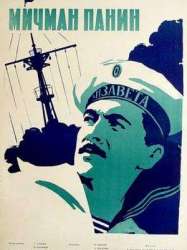Mikhail Schweitzer is a Director, Scriptwriter and Assistant Director Russe born on 16 march 1920 at Perm (Russie)

Mikhail (or Moisei/Moses) Abramovitch Schweitzer (Russian: Михаил (Моисей) Абрамович Швейцер, 16 February 1920, Perm, RSFSR - 2 June 2000, Russia) was outstanding Soviet film director, People's Artist of the RSFSR and People's Artist of the USSR
Mikhail Shveitser graduated from VGIK, directing class of Sergei Eisenstein art workshop. He started to work at Mosfilm Studios since 1943. Shveitser was an assistant director of Man No 217 film production in 1944. Mikhail Romm was a director of that film. When Shveitser lost his job after his first movie Glorious Path which was filming in the contestation with a cosmopolitism period, he could be accepted to work at Sverdlovsk Film Studios only with Mikhail Romm's help.
En mai 2000, il a un accident au volant de sa voiture et meurt un mois plus tard, après plusieurs opérations tentées à l'hôpital de l'Institut Sklifossovski. L'artiste est enterré au cimetière Vostriakovo.
Source : Wikidata
Mikhail Schweitzer

- Infos
- Photos
- Best films
- Family
- Characters
- Awards
Birth name Mikhail Abramovich Schweitzer
Nationality Russie
Birth 16 march 1920 at Perm (Russie)
Death 2 june 2000 (at 80 years) at Moscow (Russie)
Awards People's Artist of the USSR, USSR State Prize
Nationality Russie
Birth 16 march 1920 at Perm (Russie)
Death 2 june 2000 (at 80 years) at Moscow (Russie)
Awards People's Artist of the USSR, USSR State Prize
Mikhail Shveitser graduated from VGIK, directing class of Sergei Eisenstein art workshop. He started to work at Mosfilm Studios since 1943. Shveitser was an assistant director of Man No 217 film production in 1944. Mikhail Romm was a director of that film. When Shveitser lost his job after his first movie Glorious Path which was filming in the contestation with a cosmopolitism period, he could be accepted to work at Sverdlovsk Film Studios only with Mikhail Romm's help.
Biography
Né à Perm, Mikhail Schweitzer déménage à Moscou en 1925 avec ses parents. La sœur du réalisateur, Victoria, raconte dans l'interview à Écho de Moscou (2008) que Mikhaïl, en 1939, a tenté de passer le concours d'entrée de l'Institut de la philosophie, de la littérature et de l'histoire, mais à cause des fautes d'orthographe sa dissertation a été refusée. Il s'inscrit alors à l'Institut national de la cinématographie où il étudie dans la classe de Sergueï Eisenstein. Diplômé en 1943, il commence sa carrière à Mosfilm. Il assiste notamment Mikhaïl Romm sur le tournage de Matricule 217 en 1944. En 1949, avec ses camarades d'études, Boris Bouneïev et Anatoli Rybakov, il tourne Le Chemin de la gloire. En 1954, son adaptation de la nouvelle Dirk d'Anatoli Rybakov, réalisée en collaboration avec Vladimir Venguerov, arrive à la neuvième place par le nombre de spectateurs (27,57 millions). Distingué artiste du Peuple de la RSFSR en 1977, Schweitzer obtient le titre d'Artiste du peuple de l'URSS en 1990.En mai 2000, il a un accident au volant de sa voiture et meurt un mois plus tard, après plusieurs opérations tentées à l'hôpital de l'Institut Sklifossovski. L'artiste est enterré au cimetière Vostriakovo.
Usually with
Filmography of Mikhail Schweitzer (9 films)
Director

Kreutzer Sonata (1987)
, 2h29Directed by Mikhail Schweitzer
Origin Russie
Genres Drama, Romance
Actors Oleg Yankovsky, Alla Demidova, Stepan Krylov, Radner Mouratov, Mikhaïl Glouzski, Inna Goulaïa
Rating73%






Dead Souls (1984)
, 6h27Directed by Mikhail Schweitzer
Genres Drama, Comedy, Historical
Actors Tamara Nossova, Innokenti Smoktounovski, Iouri Bogatyriov, Vyacheslav Nevinny, Inna Tchourikova
Rating74%






Little Tragedies (1980)
, 4hDirected by Mikhail Schweitzer
Genres Drama, Romance
Actors Vladimir Vysotsky, Sergueï Iourievitch Iourski, Innokenti Smoktounovski, Leonid Kouravliov, Nikolai Petrovich Burlyayev, Ivars Kalniņš
Rating77%






The Golden Calf (1968)
, 2h54Directed by Mikhail Schweitzer
Genres Drama, Comedy
Actors Sergueï Iourievitch Iourski, Leonid Kouravliov, Zinovi Gerdt, Yevgeniy Yevstigneyev, Pavel Pavlenko, Radner Mouratov
Rating81%






Time, Forward! (1965)
, 2h38Directed by Mikhail Schweitzer
Genres Drama, Historical
Actors Sergueï Iourievitch Iourski, Leonid Kouravliov, Inna Goulaïa, Tamara Syomina, Bruno O'Ya, Radner Mouratov
Rating69%





The action takes place in the 1930s. The film describes one day of the construction work of Magnitogorsk Iron and Steel Works (or Magnitka).

Resurrection (1960)
, 3h29Directed by Mikhail Schweitzer
Genres Drama, Romance
Actors Yevgeny Semyonovich Matveyev, Tamara Syomina, Aleksei Smirnov, Vassili Livanov
Rating76%






Midshipman Panin (1960)
Directed by Mikhail Schweitzer
Genres Drama, War
Actors Viatcheslav Tikhonov, Leonid Kouravliov, Ivan Pereverzev, Mikhaïl Glouzski
Rating66%





The storyline of the movie is based on the memoirs of an old Bolshevik named Vasily Lukich Panyushkin. It is May of 1912. Thirteen political prisoners are being tried in a naval fortress of Kronstadt. They are sentenced to death by hanging. A clandestine Bolshevik organization decides to free the prisoners during their transfer to the place of execution. Vasily Panin (played by Vyacheslav Tikhonov), a junker of a school of naval engineers, is one of those entrusted with this dangerous task. The day Panin is promoted to warrant officer is the day he is baptized by fire. In the evening of that same day Panin arrives at a military vessel named Elizaveta, which is supposed to leave for France the next morning. The freed prisoners go out into the sea on a fishing boat and soon find themselves in a desperate situation. Panin and other Bolshevik seamen onboard Elizaveta hide the fugitives in a non-operational boiler of the ship. Elizaveta sails on. Naval officers and petty officers dart about the ship and are close to discovering the fugitives. Petty officer Savichev (Leonid Kmit) comes across the fugitives, and Panin throws him overboard. Finally, Elizaveta arrives in Gâvres. The fugitives manage to disembark under the guise of sailors on shore leave. Warrant officer Panin is a relief commander. That same evening the crew returns from their shore leave short of thirteen people. Captain Sergeyev of Elizaveta (Nikolai Sergeyev) realizes that warrant officer Panin has something to do with the escape and offers him to remain in France. In France, Panin establishes contact with local Bolshevik emigres, who provide him with the money and a passport to return to Russia. He receives a letter from Vladimir Lenin, in which the latter expresses his regret regarding Panin's being away from the Navy. And then warrant officer Panin decides to return to his ship in Kronstadt. He is arrested and stands trial. At the trial, however, he tells a made-up story about his love affairs, and the court decides to simply reduce him to the ranks. Upon becoming a matrose, Panin joins the revolutionary movement yet again.

The Cutlass (1954)
, 1h28Directed by Mikhail Schweitzer, Vladimir Venguerov
Origin Russie
Genres Adventure
Themes Children's films
Actors Sergueï Filippov
Rating63%





Scriptwriter

Kreutzer Sonata (1987)
, 2h29Directed by Mikhail Schweitzer
Origin Russie
Genres Drama, Romance
Actors Oleg Yankovsky, Alla Demidova, Stepan Krylov, Radner Mouratov, Mikhaïl Glouzski, Inna Goulaïa
Rating73%






Dead Souls (1984)
, 6h27Directed by Mikhail Schweitzer
Genres Drama, Comedy, Historical
Actors Tamara Nossova, Innokenti Smoktounovski, Iouri Bogatyriov, Vyacheslav Nevinny, Inna Tchourikova
Roles Writer
Rating74%






Little Tragedies (1980)
, 4hDirected by Mikhail Schweitzer
Genres Drama, Romance
Actors Vladimir Vysotsky, Sergueï Iourievitch Iourski, Innokenti Smoktounovski, Leonid Kouravliov, Nikolai Petrovich Burlyayev, Ivars Kalniņš
Roles Writer
Rating77%






The Golden Calf (1968)
, 2h54Directed by Mikhail Schweitzer
Genres Drama, Comedy
Actors Sergueï Iourievitch Iourski, Leonid Kouravliov, Zinovi Gerdt, Yevgeniy Yevstigneyev, Pavel Pavlenko, Radner Mouratov
Roles Writer
Rating81%






Time, Forward! (1965)
, 2h38Directed by Mikhail Schweitzer
Genres Drama, Historical
Actors Sergueï Iourievitch Iourski, Leonid Kouravliov, Inna Goulaïa, Tamara Syomina, Bruno O'Ya, Radner Mouratov
Roles Writer
Rating69%





The action takes place in the 1930s. The film describes one day of the construction work of Magnitogorsk Iron and Steel Works (or Magnitka).

Resurrection (1960)
, 3h29Directed by Mikhail Schweitzer
Genres Drama, Romance
Actors Yevgeny Semyonovich Matveyev, Tamara Syomina, Aleksei Smirnov, Vassili Livanov
Roles Writer
Rating76%





Director

Girl No. 217 (1945)
, 1h40Directed by Mikhaïl Romm
Origin Russie
Genres Drama
Actors Elena Kouzmina, Yevgeny Morgunov, Tatyana Barysheva, Lidiya Sukharevskaya
Roles Assistant Director
Rating72%





La dure existence de travailleurs russes déportés en Allemagne durant la Deuxième Guerre mondiale. Le matricule n° 217, la jeune femme russe Tanya, est abandonnée pour une somme dérisoire à l'épicier Krauss. Elle est maltraitée continuellement. Le portier, le savant mathématicien Sergueï Kartachov, subit un sort identique. Refusant de coopérer avec une entreprise allemande, il doit se plier à d'intolérables humiliations et tortures qui lui coûteront la vie. Déterminée, Tanya se venge des bourreaux.
 Connection
Connection


